#wu ce
Text
hey gamers, so in the past months i kind of phased out of playing yi xian (and got obsessed with gujian3 instead lol) but someone brought it back to my brain so I fired it up to check whats new and the new characters (I kept up to date with the news on steam even though I wasn't playing lol) and,,,, weary sigh,, the brainrot is back hsdjhks so here
anyway cloud sword sect keeps on winning baybee!! the new character is so cool I love Lu Jianxin 😭💜 easily my new second place favourite sjdhk the mechanics of magically forging the sword throughout the battle is so so so fun




ok and more drawings under cut because i dont wanna make everyone scroll thru a long post about yi xian of all things hjaskd
ok anyway!!!! the ultimate title for getting most dao points with Mu Yifeng is literally "shixiong" sdhaks and SO TRU HE IS THE ULTIMATE SHIXIONG 💕💕 tea shixiong ftw

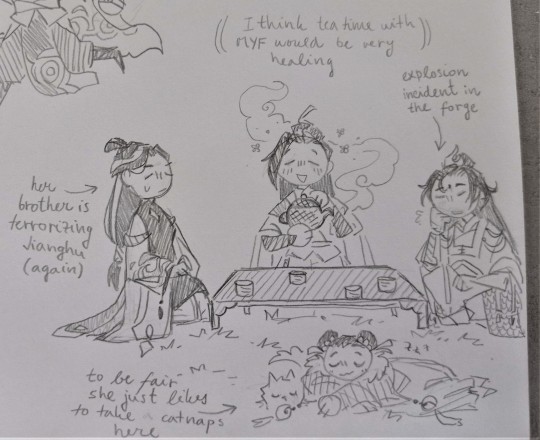
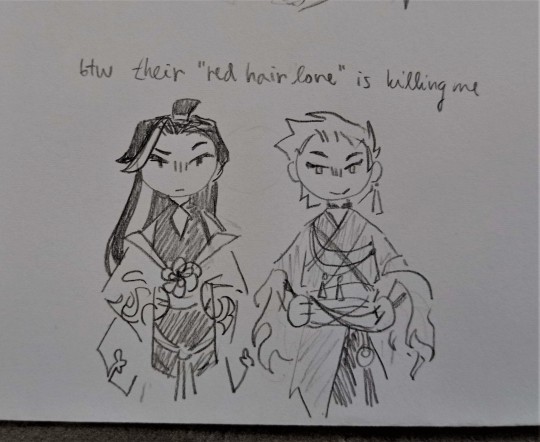
and also also!! played the new story mode and lets go! my boys interaction hahhah yipee


and Lu Jianxin being iconic hahhsdj hes so cool about also so silly heart
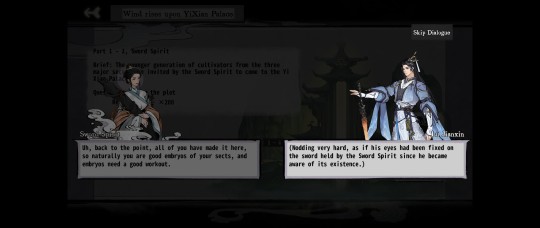
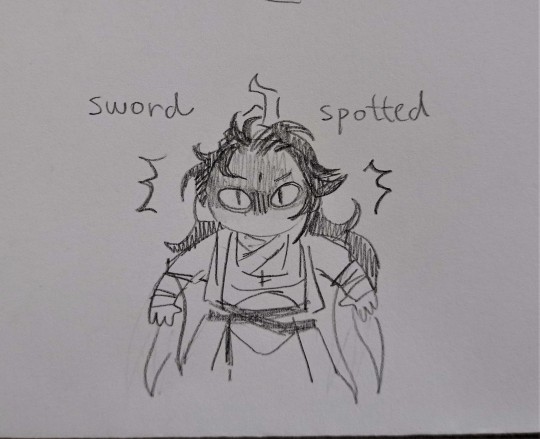
And now segway to our other new character Wu Ce! and not gonna lie I am entirely making all their lore (aside from what we know from the first lore entry) up because I suCK ASS at heptastar. my brain is tiny. so I am never leveling them up enough to get to know their story hasdjk
but like listen. i know its most likely that after they got set up by the generals they disappeared off to heptastar to chill like that but.. listen theyře a schemer, you cant double cross your war strategist and then get out scot-free so I think Wu Ce should snap and spitefully cook something up as a revenge before dipping out. ykno as a treat
(if anyones curious and read this far and wants context, all that is known from the first entry is that Jiang Ximing (white hair, heptastar) taught them when they were younger and gifted them the star moon folding fan. Wu Ce then grew up to be very talented in astronomy and scheming. they then become a war strategist and are very successful which causes their superiors to grow jealous of them and the superiors set Wu Ce up. Wu Ce disappears after that and its implied that that's when they joined heptastar pavilion)
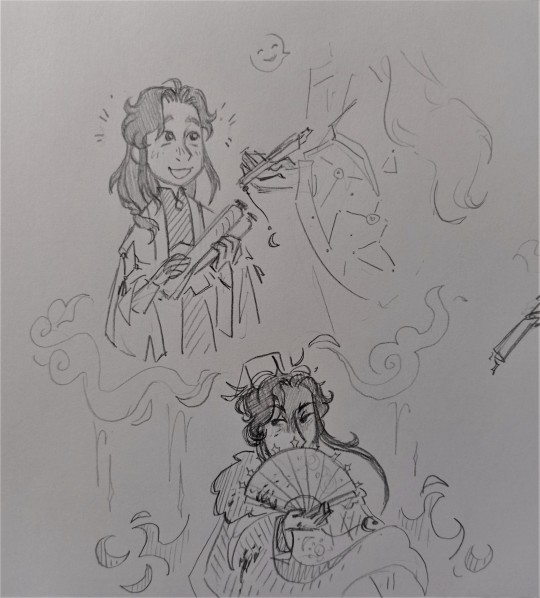
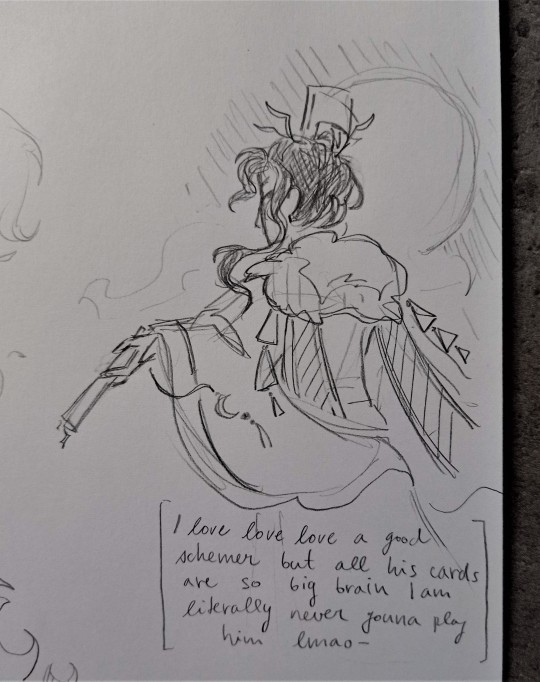
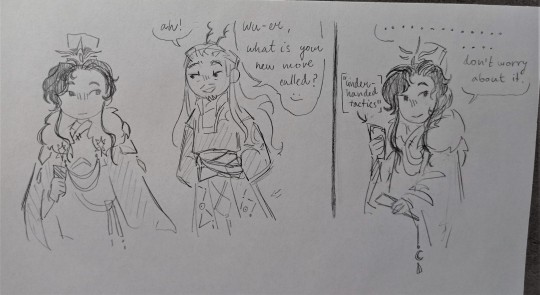
so yea they very cool 💜💜 but my brain is so so so small 💔💔 i cant even figure out how to play as normal heptastars nevermind their absolutely convoluted 40 steps schemey cards hsajkdh
also last thing i just realized that the new game cover that they switched to for the season of wind in game has the three new characters that they added in the corner! and that I wildly misjudged the length of Lu Jianxin's hair ghdjashgdjsa

also speaking of hair, heres MYF model because look at the absolute lengths hsjhdsjdhks icon icon icon (also pls appreciate the detail that his robe coattails are made so he matches the swallows of the mountain 🖤🖤)

ok thats all hahahja bye bye xD
#yi xian#yi xian: the cultivation card game#idk why im tagging it when im still shadowbanned but hey order in the tags never hurt anyone hsdkjs#i am back on my 'game i suck at' bs hsdskads#mu yifeng#lu jianxian#wu ce#i forgot all my card skills in the meantime and I didn't have many to begin with shdkasjhd#but ive been only playing PVE gamemode nayway because anxiety is a bitch hajshdk#lastly#hey neonghostcat if ur reading this 😊😊😊 i hope I am enabling your brainrot hsjkdhsk suffer with me
39 notes
·
View notes
Text
youtube
Liu Ce vs Sebastian Lutaniuc - Wu Lin Feng 2024: 12th Global Kung Fu Festival
I'd argue the only good thing to come out of any of the recent big weight kickboxing tournaments and Grand Prix has been the emergence of Liu Ce as a real cruiserweight to watch. The Chinese fighter won the K-1 Openweight tournament last September with relative ease. At 6'5 and 27 years old, he's athletic, powerful, and mobile.
Ce will face off with the K-1 Cruiserweight champion Sina Karimian for the title at the big K-1 World MAX 2024 - World Tournament Opening Round card this Tuesday (March 19, in the US) which will be on Triller TV.
2 notes
·
View notes
Text
You're not *really* sworn bros unless you both die because you got so annoyed that you reopened potentially life-threatening wounds that hadn't fully healed like Zhou Yu and Sun Ce.
23 notes
·
View notes
Photo
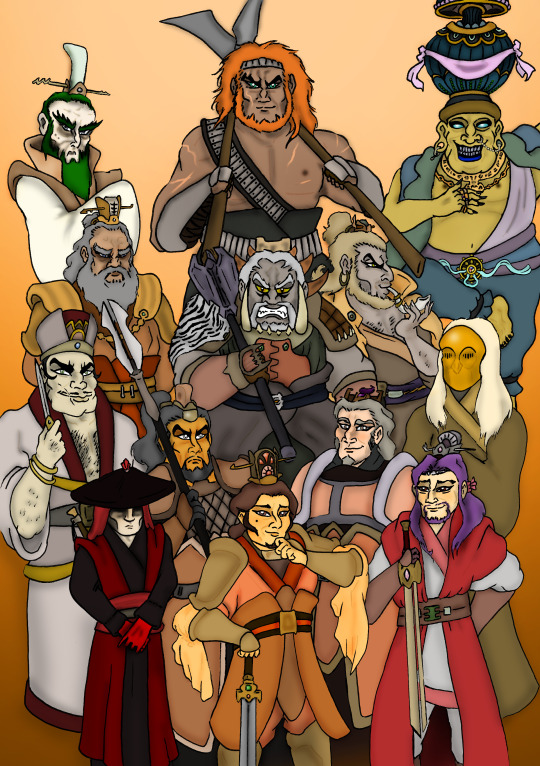
Liu Yao’s Army ‘The Yang Alliance’
(Left to Right)
Top Row
Xu Gong, Taishi Ci, Ze Rong
Upper Middle Row
Lu Kang, Yan Baihu, Yan Yu
Lower Middle Row
Liu Xun, Zhou Xin, Zhu Hao, Sheng Xian
Bottom Row
Hua Xin, Liu Yao, Wang Lang
A motley collection of scholars, warriors, eccentrics and opportunists.
Ze Rong was a treat to design. I’m surprised he doesn’t get more attention in 3K-related media.
#Liu Yao#Wang Lang#Hua Xin#taishi ci#yan baihu#ze rong#yang province#Sun Ce#Sun Wu#Eastern Wu#Three Kingdoms#Romance of the Three Kingdoms#sanguosha#sangoku#Han Dynasty#Cao Cao#historical fiction#webcomic#ttoca
4 notes
·
View notes
Text
ack rng rolled a trait for Zhou Yu that puts him in conflict with Sun Ce that sucks
#my rambles#might adopt him just for the 'relationship greatly deepens between adoptee and faction leader' bonus#would probably make lady wu and sun quan unhappy but well. shrug. gotta follow the story y'know#can adopt him and pretend I made zhou yu and sun ce sworn brothers instead#tw3k
0 notes
Text
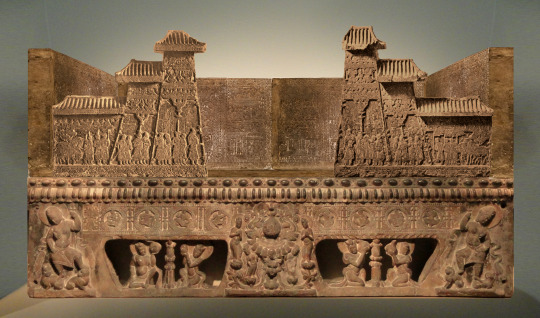


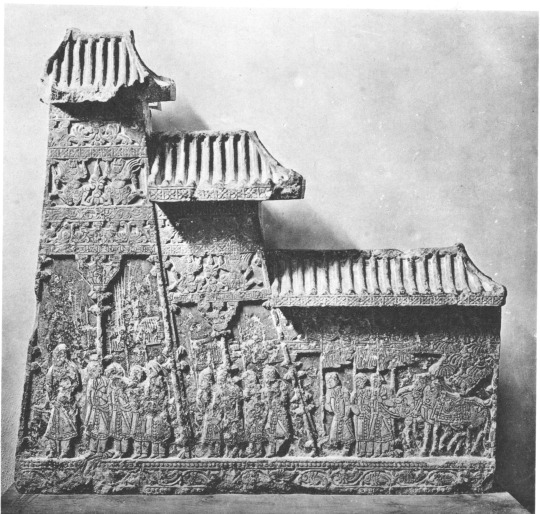

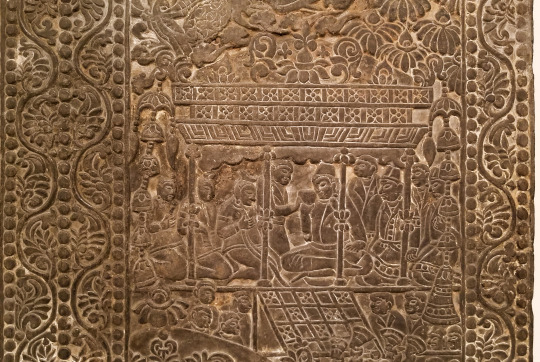
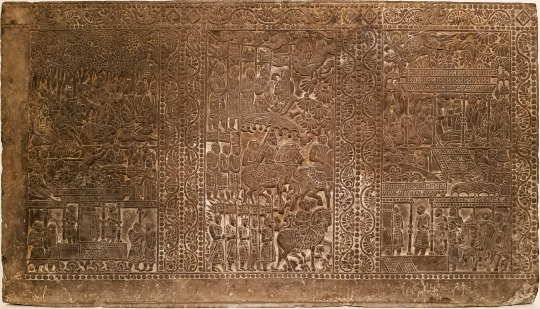




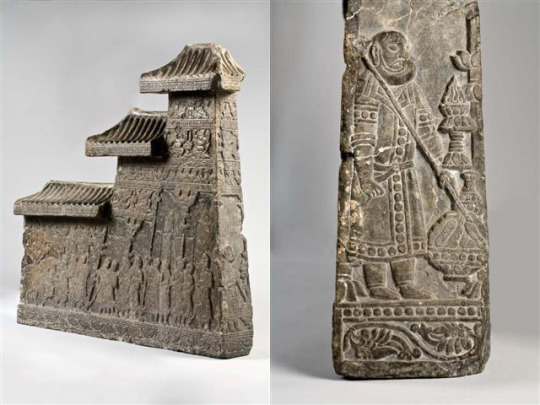
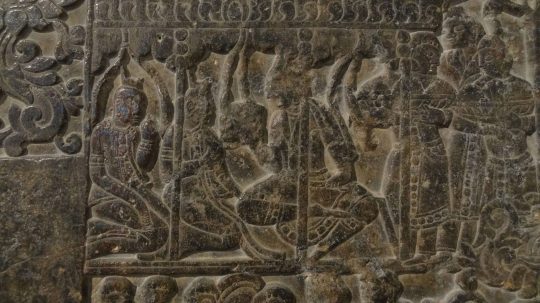

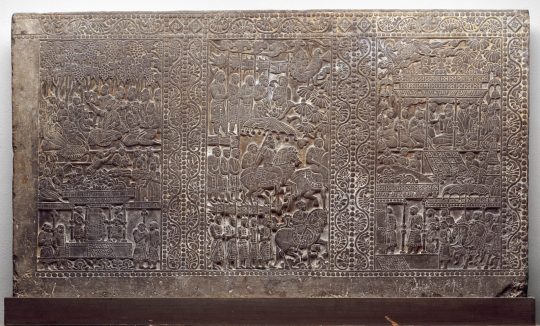

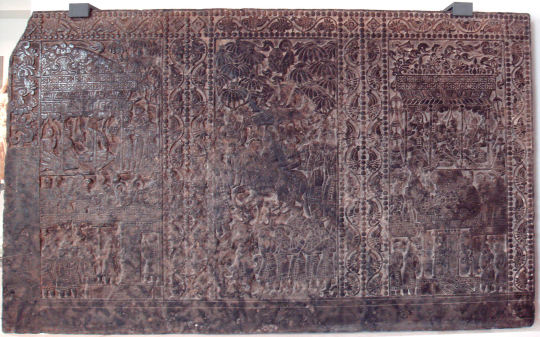

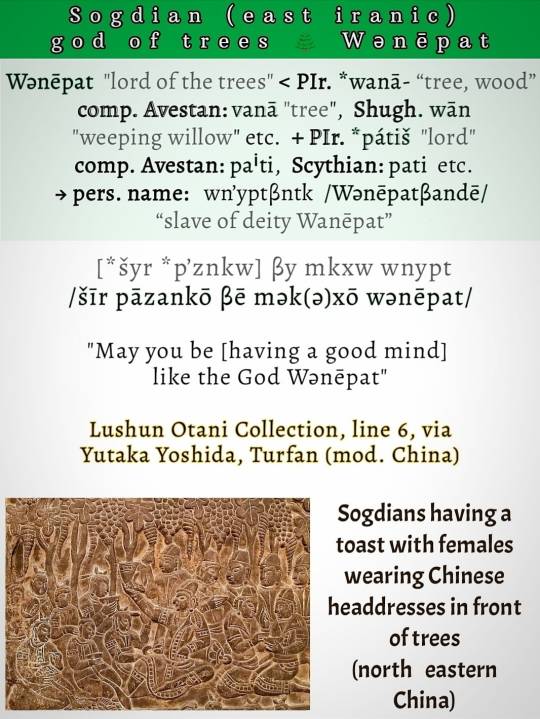
Anyang funerary bed 550-577 CE
"The Anyang funerary bed (Chinese: 安阳北齐石棺), also known locally as the Bed of Ts'ao Ts'ao (from the Chinese hero Cao Cao), is a Chinese funerary couch belonging to a Sogdian merchant and official active in China in the 6th century CE. The tomb was discovered in 1911, and the components of the funerary bed were dispersed among various museums in the world after being offered on the art market. It is thought the funerary bed was excavated in Anyang (ancient Zhangdefu), capital of the Northern Qi dynasty. It is stylically dated to the Northern Qi dynasty (550–577 CE).
There are eight known components of this funerary monument: a dais and two cornices with notched ends, now in the Freer Gallery of Art, a pair of gates, now in the Museum of East Asian Art (Cologne), two rectangular slab in the Boston Museum of Fine Arts, and one slab in the Guimet Museum in Paris.
The funerary bed is important to Sogdian art and culture, as it is decorated with musicians in the typical Sogdian attire and with a Buddhist scene including deities. The ensemble of Sogdian musicians includes two lute players, a flutist, two drummers and a cymbal player, as well as two dancers. Two stretchers once attached to the bed showed what the Chinese called a huxuan wu (胡旋舞), i.e. "Sogdian Whirl dance", which was enormously popular in China, and appears on many Chinese tombs. Tang sources confirm the dance's popularity. It was performed at court by the Tang Chinese emperor Xuanzong and his favorite concubine.
Gustina Scaglia was the first to recognize in 1958 that the pieces scattered in several museums belonged to a single funerary couch made for a member of the Sogdian community in China.
The owner and exact history of the owner of the tomb remain unknown, as the epitaph has been lost.
Sogdian stone funerary beds disappear during the subsequent Tang dynasty period, even though Sogdian influence was probably even more significant in China at that time, possibly due to Imperial restrictions regarding funerary practices."
-taken from Wikipedia
#sogdiana#ancient history#art#antiquities#history#sculpture#statue#museums#archaeology#ancient china#antiquity#anthropology
226 notes
·
View notes
Text
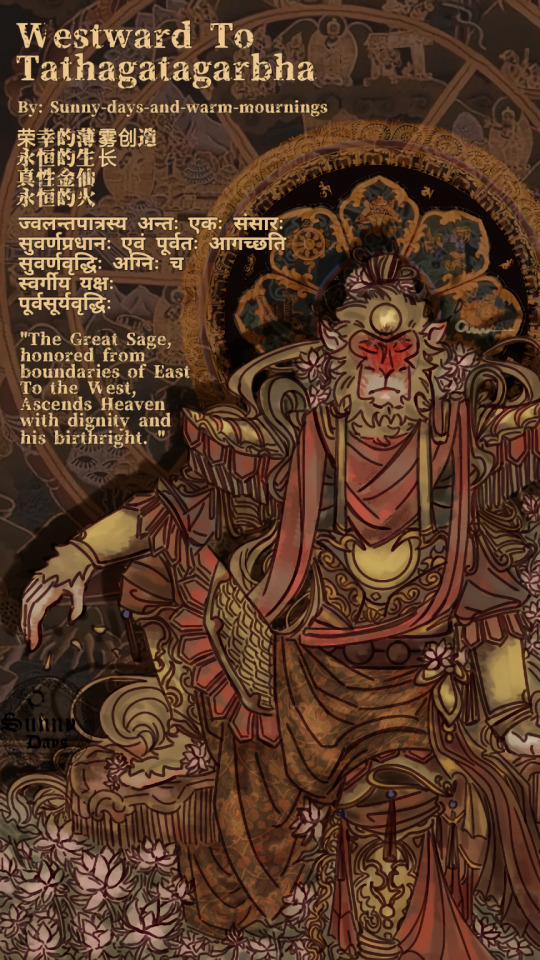
It is finally finished!! I am done and is so happy!!!
This is an AU exploring the concept of Sūn Wùkōng/Dàshèng as a Yaksha and Tu Di Gong, rather than being a Yaoguai Warlord during his later years reigning as the Monkey King.
This AU follows the beginning (with some changes here and there) up until Wùkōng's shenanigans with Ao Guang, then he went on a separate path from Wu Cheng'en's novel.
In this iteration our favourite Monkey explored the realms as he burned up time, but then he took a particular interest in the humans' ways of producing food. Since Dàshèng was so used to the grandeur and bounties of Huagoushan (being surrounded by such lush forests and mountains that never withered nor died) he sort of took pity on them before deciding to help them grow their crops much better.
But this is just the very much shortened summary of the beginning of this AU, and I have compiled some research and even more lore in my Google Documents just to expand on this idea more.
This— Westward To Tathāgatagarbha Lore Google Documents
This is the Google Document of my AU, which I highly recommend for you to read! It explains all the other details and such on this story! I did my best on making them but there would be still mistakes that I have yet to find, but it should be decent!!

This is a more casual look for Dàshèng/Wùkōng for this AU as well as some brief pointers! I made this before the portrait so some things might have changed.
(Don't mind him holding a cup of beer it's fine.)
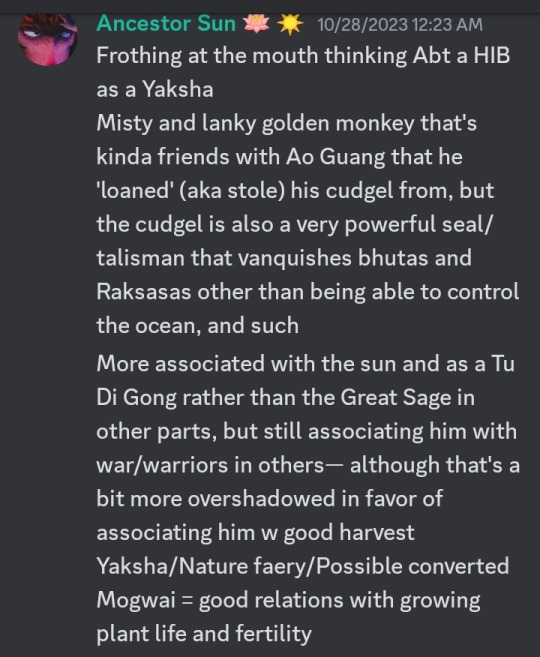
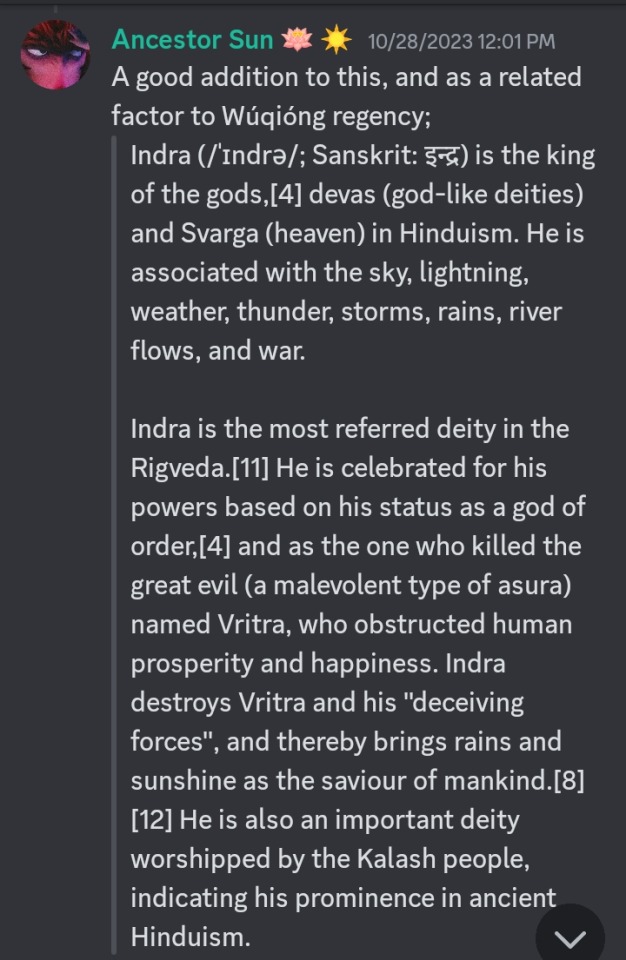
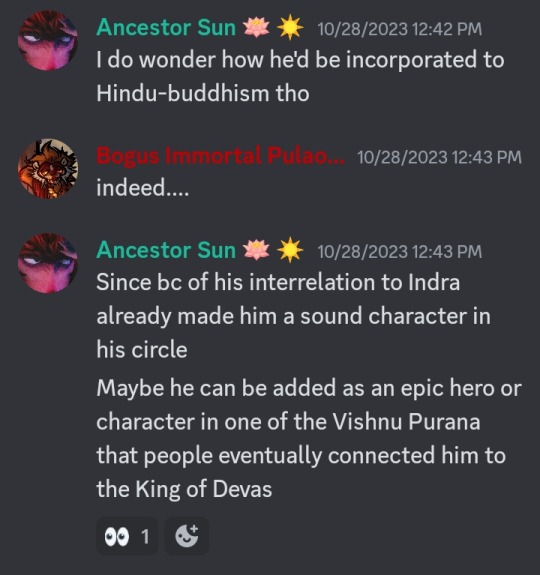
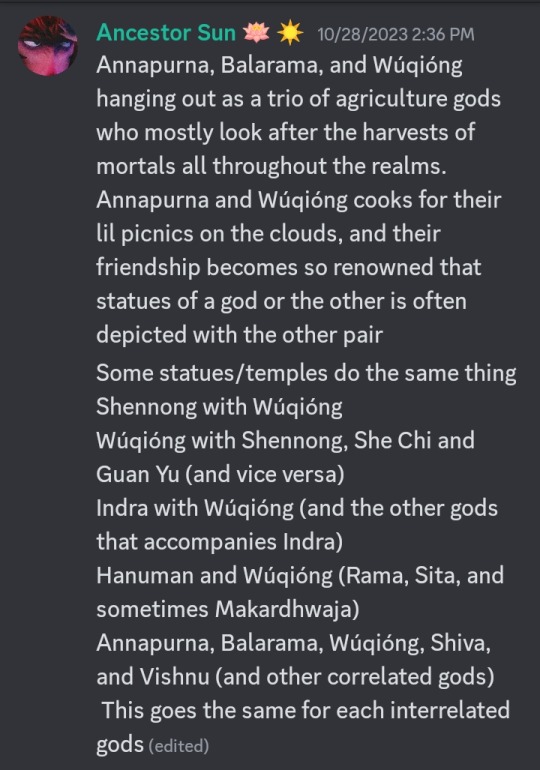
Taken from the server (with some hints for the next half of the archives/docs) which instantly kickstarted this whole thing haahahjjjss, but it really was so fun talking about it to others! They gave me more inspiration that I can handle.
And what is Tathāgatagarbha you ask? (Brief)
In Buddhist philosophy, Buddha-nature is the potential for all sentient beings to become a Buddha or the fact that all beings already have a pure buddha-essence within. "Buddha-nature" is the common English translation for several related Mahayana Buddhist terms, most notably tathāgatagarbha and buddhadhātu, but also sugatagarbha, and buddhagarbha. Tathāgatagarbha can mean "the womb" or "embryo" (garbha) of the "thus-gone one" (tathāgata), and can also mean "containing a tathāgata". Buddhadhātu can mean "buddha-element," "buddha-realm" or "buddha-substrate"
The Chinese translated the term tathāgatagarbha as rúláizàng (如来藏), or "Tathāgata's (rúlái) storehouse" (zàng). According to Brown, "storehouse" may indicate both "that which enfolds or contains something", or "that which is itself enfolded, hidden or contained by another." The Tibetan translation is de bzhin gshegs pa'i snying po, which cannot be translated as "womb" (mngal or lhums), but as "embryonic essence", "kernel" or "heart".
The term tathagatagarbha first appears in the Tathāgatagarbha sūtras, which date to the 2nd and third centuries CE.
There will be more to this in the future when I'm finished researching more about it.
Also, speaking of people that inspire me, I'm calling my dear friends here who I think might like this: @digitalagepulao @kaijufluffs @sketching-shark @lavaflowe @sixteenthchapel @jttw-monkeybusiness and @hcdragoncat !!
Special thanks to Pardal and Grandpa Sun for getting me to write more of this too :D I had such great fun!
I have so much more to add to the docs and here but this is all for now :) and honestly this is one of the greatest projects I've started aside from the older ones. I'll come back again soon with more additions and art! And lore (And maybe some interactions with a few West Heaven occupants??)!!!
#xiyouji#jttw#jttw au#jttw fanart#journey to the west#journey to the west au#journey to the west fanart#jttw sun wukong#sun wukong#sun wukong fanart#the monkey king#monkey king hero is back#monkey king: hero is back(2015)#art#swk fanart#swk#nezha reborn#monkey king reborn#Westward To Tathāgatagarbha#Westward AU#dasheng#hinduism#hindu mythology#budhism#buddhist mythology
198 notes
·
View notes
Note
So, what IS the Samadhi Fire/True Fire of Samadhi? It can't be an average flame if it can take out Sun Wukong himself in JttW and the name sounds like it means something, but I can't find any context when I look it up.
Journey to the West states that Samādhi fire is not like earthly or heavenly flame. It is something more. Part of a poem in chapter 41 reads:
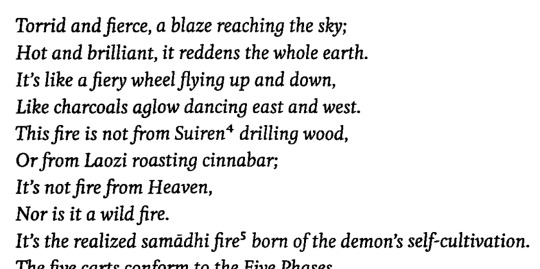
(Wu & Yu, 2012, vol. 2, p. 225)
The general concept of Samādhi (Sk: "concentration"; Ch: sanmei, 三昧) refers to an advanced level of meditation where one can "establish and maintain one-pointedness of mind on a specific object of concentration" (Buswell & Lopez, 2014, p. 743). Some Hindu and Buddhist sources associate it with a spiritually cleansing flame. One example comes from the Gaṇḍavyūha section of the Avataṃsaka Sūtra (Ch: Dafang guangfo huayan jing, 大方廣佛華嚴經; compiled by the 3rd or 4th-century CE).
Sudhana (Ch: Shancai tongzi, 善財童子; i.e. Red Boy), the holy work's protagonist, seeks out 53 teachers in the course of his spiritual cultivation. His ninth instructor, a learned Brahmin named Jayoṣmāyatana (Ch: Shengre poluomen, 勝熱婆羅門; lit: "Victorious Heat Brahmin") is said to have achieved "the light of the concentration [i.e. Samādhi] of adamantine flame" (jingang yan sanmei guangming, 金剛焰三昧光明) (Clearly, 1993, p. 1218). The fire that he produces is so powerful that it scares even the gods and demons. Though, the point of the flames appears to be incineration of the ego and desires and illumination of the mind. Sudhana follows his instructions by throwing himself into the fire, thus gaining a higher level of spiritual knowledge.
Here is a translation of that section of the sutra (warning: it is wordy):
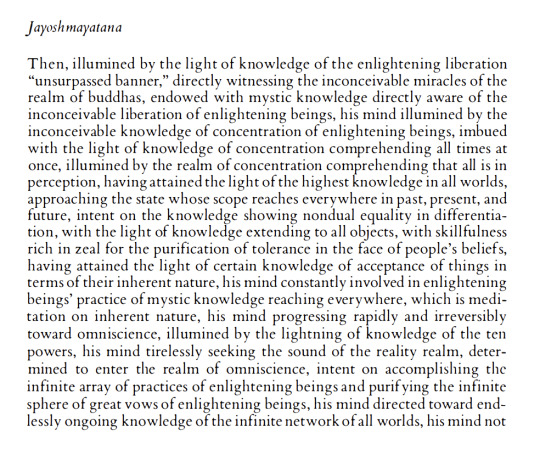
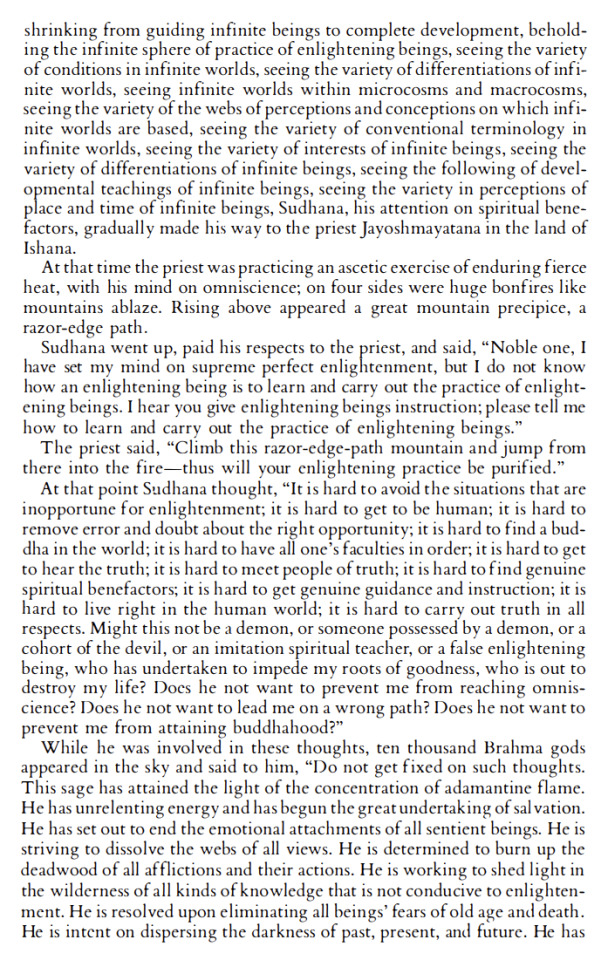
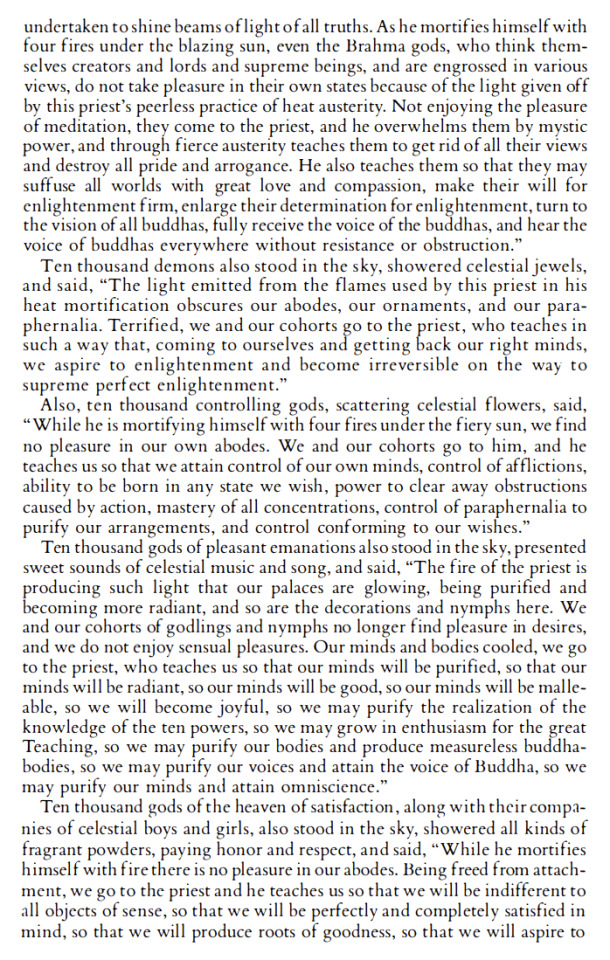
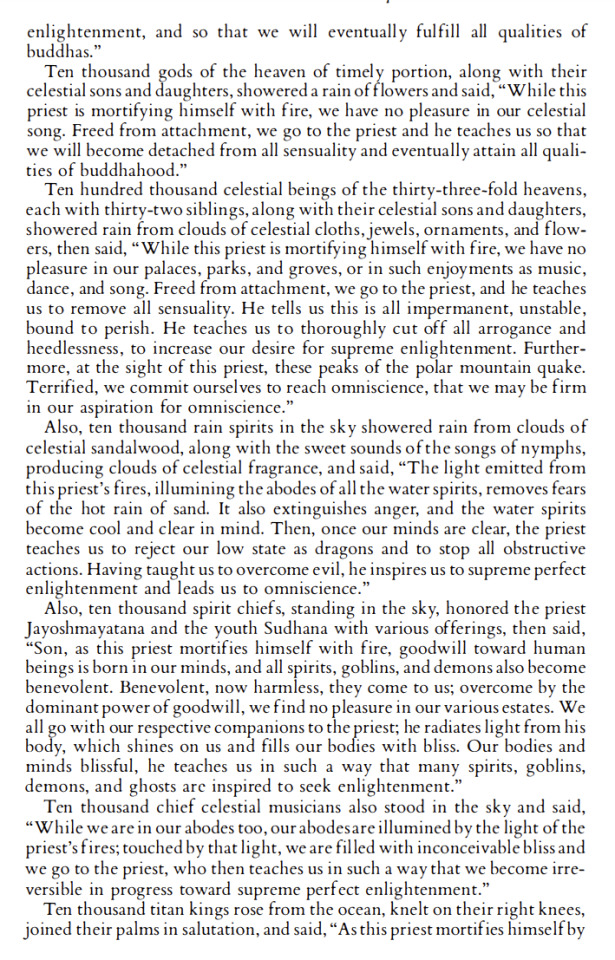
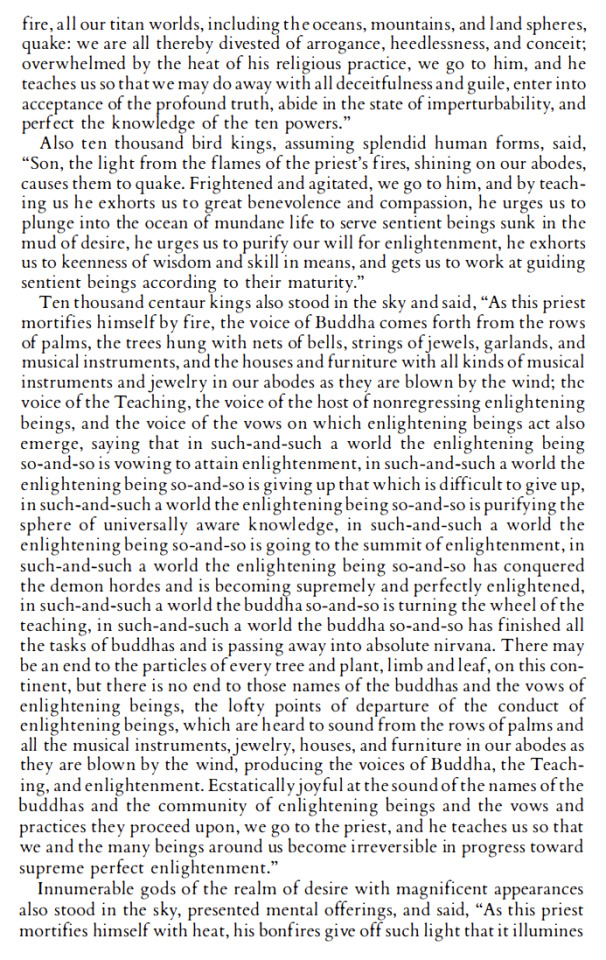
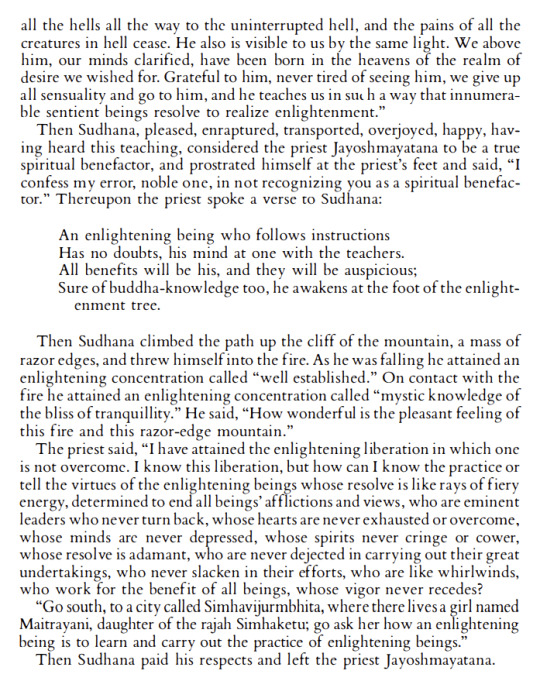
(Clearly, 1993, pp. 1217-1222)
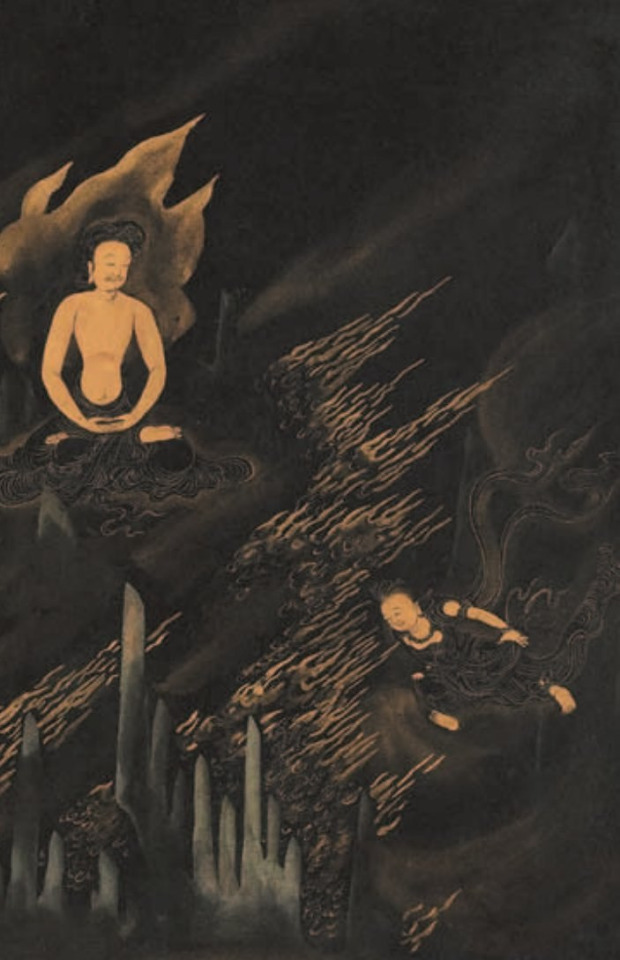
A Song or Ming-era Japanese painting of the fire brahmin and Sudhana.
Sources:
Buswell, R. E. , & Lopez, D. S. (2014). The Princeton Dictionary of Buddhism. Princeton University Press.
Cleary, T. (1993). The Flower Ornament Scripture: A Translation of the Avatamsaka Sutra. Boston: Shambhala.
Wu, C., & Yu, A. C. (2012). The Journey to the West (Vols. 1-4) (Rev. ed.). Chicago, Illinois: University of Chicago Press.
#Samadhi fire#Samadhi flame#Red Boy#Red Son#Journey to the West#JTTW#Buddhism#Hinduism#Samadhi#Lego Monkie Kid#Sudhana#Shancai tongzi#Chinese religion#Indian religion#meditation
97 notes
·
View notes
Text
Best character surnamed: Shangguan
Come and vote for the best characters with the same surname!*
What does best mean? It's up to you! Whether you love them, are intrigued by their characters, love to hate them, or they're your '2 second blorbos whose personality you made up wholesale', these are all reasons for you to vote for your favs!
*note, the surnames are not exactly the same in all the cases, as often there will be a different character. I am, however, grouping them all together otherwise things got more complicated.
Propaganda is very welcome! If I’ve forgotten anyone, let me know in the notes.
This is part of a larger series of ‘best character with X surname’ polls’. The overview with ongoing polls, winners, and future polls can be found here
NB: Shangguan Jing is a contestant again as I hadn't realised her surnamed was 'Shangguan' and not 'Shang' in a previous poll
#poll#under the power#white cat legend#my journey to you#new life begins#in blossom#no boundary#fairyland lovers#a clear and muddy loss of love#the legend of flying daggers#xiaoli feidao
16 notes
·
View notes
Text
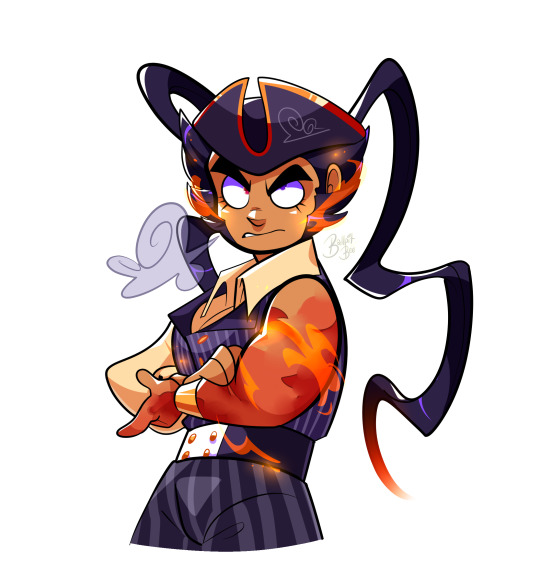
CAPTAIN CE LI Of the Eternally Smoking Ship of Zi Wu >:3
47 notes
·
View notes
Text
So, Xie Lian descends from Heaven without stopping to let Ling Wen get even a single word in. He goes back to doing what he normally does, completely unaware that he just turned literally all of Heaven upside down. He spends several years this way (maybe even decades?? he has an excellent track record hiding from people) but Feng Xin and/or Mu Qing eventually find him and go wtf dude. So, since he's technically a fugitive now (Heaven saw him ascending, destroying everything, then rapidly descending similarly to a terrorist (except terrorism as a term doesn’t exist yet, so the xianxia equivalent ig) attack, oops. Speculation is that he works for Hua Cheng!!! which makes the man himself feel a certain type of way ofc) he flees down the Silk Road and ends up in Rome. He DID spend the time he was still in China (or the territories that would become China, since I'm estimating this at around 0 CE for my own sanity) trying to defeat random ghosts to repay his debt, but quickly realized it was futile.
ofc Feng Xin and Mu Qing now realize that this wasn't a terrorist attack! They already knew that, but Xie Lian's reaction is only proof! They go to Jun Wu, who decides that "Xianle" should be reinstated to his rightful position in Heaven. Yay! Except now they can't find Xie Lian Anywhere. Cue manhunt.
Meanwhile Xie Lian has been enlisted to the Roman army. Which, hey, he'd rather not do that. So he manages to finagle himself into a position on a small northern island which shouldn't see too much conflict. However, this is very much not the case! The Britons relied on the Roman army to defend themselves from the Saxons! So, Xie Lian just deserted and quietly retreated to gather scraps in some forgotten corner of the island. He gets caught in a storm and winds up in Ireland. He's still there when the Romans leave the island in 410 and when St. Patrick comes in 433. Turns out St. Patrick isn't actually an ascended official! How disappointing. For unrelated reasons, Xie Lian returns to Briton, now thoroughly "invaded" (read: culturally integrated) by the Angles and Saxons. He putters around the island for a while longer before heading back to the mainland (read: was exiled to the mainland. For witchcraft. In a boat with rocks in the bottom (very pseudo-historical, as far as I know the 5th century Britons were most definitely not executing people for witchcraft. Witchcraft was a fun hobby they did on the side, not a crime. However, I’d like to see you see someone stand up after being shot in the eye and not throw him in the sea. Yeah, that’s what I thought)).
He hitches up with the Merovingians, who deeply appreciate his rockin' haircut. Clovis (famously brutal and murderous, but then again who isn't), however, Did Not appreciate his ability to walk off a stabbing. Clovis stabs Xie Lian a couple extra times to be sure, then cuts his head off and sets him on fire. It takes Xie Lian about a decade to come back from that, so now it’s 511 and Clovis is dead. Xie Lian decides that he should try some other place on for size.
He ends up in a catholic monastery in Spain. This is where he learns to read Latin, which will later help him learn to read Spanish, French, German, English, you name it. Obviously, he can't pay the entrance fee, so he's a lay brother doing grunt work. He's fine with this. Although he has gathered some knowledge of the local religion, it's not something he can afford to be questioned on (thankfully, literally no peasant ever was educated in the scriptures so he was fine). The atmosphere vaguely reminds him of Mt. Taicang (in literally the vaguest possible sense), and he wonders if this is what Mu Qing had to deal with.
Then the abbot notices he hasn't aged and decides that he's an angel sent by God. Xie Lian decides it's about time for a change of scenery. They've probably forgotten about him in Briton, right?
Unfortunately, he's not that lucky. The abbot isn't willing to let him go that easily, and he and his successors chase him around Spain until 711, at which point they have other problems. Xie Lian reaches Briton and joins another monastery because that was nice. Poverty, chastity, obedience, thy name is Xie Lian!
Fortunately, this monastery is more willing to "overlook" his lack of aging. Unfortunately, this monastery is Lindisfarne, and is destroyed by Vikings in 793. Noticing that Xie Lian doesn't die when killed, the Vikings decide that he's the mortal incarnation of Thor, obviously. They take him with them, fit him out with armor and weapons, and bring him back when they sack Westphalia. He doesn't like killing anyone, but that's fine with them! They're just glad to have the mortal incarnation of... probably not Thor with them! While Xie Lian is still upset that they killed all those monks, he's gotta admit this is the best people have treated him since... his first ascension... ah, shit, he's gotta get out of here. He’s been having too much fun, this was supposed to be penance, mental spiral, etc etc. Maybe just in a bit, though.
They keep asking him to stay just a bit longer, kill just one more sea monster, please, your holiness, until suddenly it's 911 and Rollo is sacking what will become Normandy. When the French king gives it to them as a "please stop, thanks," Xie Lian goes there with Rollo. Then he leaves. The newly dubbed Normans are sad, of course, but they can't keep holding their god back! In reality, Xie Lian is worried that his bad luck is going to catch up to him.
For a while, he falls back into his scrap collecting ways -except, it isn't as easy in medieval Europe. They live in small, insular communities that don't much like strangers. So he eventually decides to just... hide in the woods.
At this point, Feng Xin and Mu Qing have obviously realized that Xie Lian isn't in China anymore (if you're wondering how it took that long, it's because they got distracted by the Warring States Period and the trail went cold). So they follow legends of a strange looking man who didn't die when stabbed to Spain. However, Xie Lian isn't in Spain. He's in the part of the world that will eventually become Germany, trying to avoid being pressed into a Crusade. Yes, it is already 1096. Keep up.
He does end up going on the Crusade as a cook. That lasts a day before they decide to throw him on the frontlines to "soften up the Moors." Xie Lian fakes his death. I could choose a specific battle, but I don't particularly care to. It was probably Antioch. Fine, it was Antioch.
He spends some time in the Byzantine Empire, which is rapidly crumbling. He flees after the Sack of Constantinople in 1204, thankfully with only minimal injuries this time. But on his way out, he briefly sees Feng Xin and Mu Qing in the chaos, fighting on the side of the Byzantine Empire. They also see him, but he leaves before they can do anything about it.
So Xie Lian fucks off to a random island in the Mediterranean. This ends up being the Island of Rhodes. He stays there doing his little scrap collecting do da until 1306, when the Hospitallers move in. Shortly after that, they themselves are booted off to Malta in another invasion. Xie Lian goes with them, bc what the hell, these guys kinda suck, they deserve the bad luck.
Xie Lian is still in Malta when the Black Plague hits in 1349. It... brings some old wounds back up to the surface. Best to just forget about it. He sticks around, anyways.
The Inquisition begins in 1478. The Hospitallers start to give him funny looks. However, he is widely viewed as a living saint, so they don’t really do anything. Xie Lian fakes his death, then barricades himself into a cave and meditates for around fifty years before coming back out. No one recognizes him. He does this a couple more times, with varying lengths of meditation. He should probably just move on, but it’s awfully difficult to get on and off Malta. Also, it’s kind of nice there.
In 1565, Xie Lian almost single-handedly holds off the siege of Malta with the aid of the inhabitants while the Hospitallers cower in their monastery. Really, these monk guys have gone downhill over the centuries. Of course, the Hospitallers and Ottomans rewrite the narrative, but who would expect any less? The truth is just embarrassing for everyone involved.
In a rare stroke of luck, Xie Lian leaves the island after the siege. Just a few short years later, in 1573, the Inquisition moves in.
It is now 1615. Xie Lian is very tired. He returns to the mainland after the siege, and now everyone is fighting over something called "indulgences." He wants to go home. He does go home! Jun Wu finds him immediately, oops. He'd been watching Mt. Taicang (insane behavior, it's been 2,000 years bro) and obviously noticed when Xie Lian went to pay respects to his parents. Xie Lian narrowly escapes and runs as far as he possibly can. Your pick whether it’s just because of the stalker-ish behavior or a Bai Wuxiang reveal. Either way, he runs all the way to the New World.
Of course, he doesn’t have the money to just... book a ship there. He signs on as an indentured servant. What are a few years off his life anyways? Unfortunately, before that can happen, he gets mugged and accidentally murders the guy. Instead of being an indentured servant in exchange for land, he is instead working off his debt to the guy's family. Which is fine, of course.
It's not, in fact, fine. After his service is done, he once more fucks off to the woods. At this point, however, most Native Americans know to be wary of foreigners, so he keeps to himself. If he gets shot by mistake a few times, it's fine, he shakes it off. At least they aren't guns. In most cases. He'll take what he can get.
He finds a cave. He meditates in the cave. He doesn't come out until 1850. It's almost being in the coffin again, except he can leave anytime. He just. Doesn't.
The shackle around his neck cracks slightly under the force of spiritual power he’s cultivated. He doesn’t notice.
The world of 1850 is very different than the world of 1650. Manifest Destiny is real and thriving. Suddenly the relatively friendly local tribes have been replaced by a bunch of other, less friendly people. The mountain used to be called Maskwa Wac, but now it’s Bear Mountain and Xie Lian is in Connecticut, apparently??? Mostly people call him strange names when he tries to ask questions, so he avoids them.
He isn’t used to people anymore. They aren’t exactly willing to get used to him, either. Centuries of dirt don’t wash out with a single bath. After two centuries in a cave, he has to relearn how to talk, write, and generally interact with the world. Culture has changed, language has changed, the entire world has changed. Xie Lian is exactly the same.
In 1863, Xie Lian finally manages to get a job. It’s gotten significantly harder to live without a job, so that’s good (maybe he should invest in this newfangled “identification” thing). Building the trans-continental railroad is a great gig for someone like Xie Lian. He’s strong and more than willing to work. The pay isn’t bad.
Unfortunately, some boulders fall on him after a misplaced TNT blast and his coworkers leave him for dead. But hey, hadn’t he heard of something called a “Gold Rush” talked about nostalgically in bars? He’s pretty sure it’s over now, but it’s worth a shot. He’s already partway there.
He only gets mauled by like three bears on the way over. It was good that he’d seen a few before at that point, or else he’d probably think they were yao. He also got shot several more times, whether by Native Americans or settlers.
The people out West hadn’t gotten a forty-niner in decades, but they’re willing to give him odd jobs mopping at bars and fixing fences and such. It’s almost nostalgic. They hear news about the South seceding and the war that follows, but it isn’t something that really affects them all the way out here. Xie Lian is glad to avoid it.
After only a couple years, he decides to go back to the East Coast. He doesn’t want to bring bad luck on these people’s heads, after all. He accidentally zig-zags down into Mexico and into South America, then overcompensates back up into Canada before finally making it to New York City.
It’s 1910. Almost the moment he steps foot in the city, he gets hit by a car. Somewhat delirious, he mistakes the car for a demon(?) and tries to kill it.
Insane asylums are not fun.
The important part is that he eventually gets out (or that’s what he tells himself). He doesn’t have the motivation to bother with a job anymore, so he bums it on the streets collecting scraps like he used to. Problem is, there’s a lot more homeless people in the post-Industrial world than the pre-Industrial one. Lots of competition for food and shelter. Usually, if it comes to a fight, Xie Lian just lets the other guy have whatever it is. It’s not like it’s life or death for Xie Lian, after all.
He gets picked up by the police, who aren’t so bad yet. Corrupt, yes, but this isn’t the Gilded Age anymore. They drop him off with a referral to work in a car factory (Xie Lian didn’t know whether to laugh or cry) and only a few bruises.
Machinery, ah... it tends to... break around him. He doesn’t last long at his new job. Neither does his job last long with him as an employee. The factory burns down. The owner has Xie Lian dropped in a river with rocks tied to his ankles. What goes around comes around, really.
In 1917, Xie Lian is drafted into WWI. So, of course, he ends up in the trenches. He’s just glad that he’s basically immune to every disease known to man. Most of his comrades aren’t so lucky.
This isn’t the type of war Xie Lian remembers fighting in -though his memories are a bit blurry at this point. They fight for inches of ground in exchange for hundreds of lives in muddy, dismal conditions. The mud kills almost more than the bombs do.
The despair is the same. That much never changes.
Xie Lian leaves. He had to. No amount of martial prowess could help stop this war. Perhaps strategy would, but even if they let some random soldier into the war room, Xie Lian wouldn’t know how to strategize with modern guns, let alone tear gas.
Feng Xin and Mu Qing are still looking for Xie Lian, of course. But the trail went cold years ago.
Hua Cheng is holding on to his existence by his fingernails these days. He’s expanded his influence globally, but he still can’t find His Highness anywhere. Ghosts everywhere tread on eggshells. In one night, he replaces every single carving and painting of Jesus in Europe with one of Xie Lian. The papacy is in an uproar, taking it as a sign from God Himself. The only person who doesn’t find it funny is Xie Lian, who is very confused. Also white supremacists. They don’t like it very much either (that just makes it funnier). It turns out that Xie Lian has been canonized as a saint a few separate times over the centuries. “His bones”/relics are in six separate churches. People start freaking out. A large portion of the Catholic church believes that Xie Lian is either Jesus (and that the rapture had already happened centuries ago) or the Antichrist. This causes a massive schism in Protestant and Catholic churches alike. Islam becomes the main Abrahamic religion. Xie Lian does his level best to ignore the people bowing to him in the streets and shaves his hair off with a bowie knife.
On another note, Jun Wu gave up on finding Xie Lian centuries ago. Turns out Xianle was just a spot of mud on his Heavenly canvas after all.
This is good. It means when Xie Lian sprints his way back across the world, Jun Wu isn’t watching Mt. Taicang anymore. Xie Lian, still a martial god, makes it there in a week at top speed. However, Mt. Taicang isn’t the same as it used to be. There’s a fence around the base, and big fancy houses everywhere. When Xie Lian touches the fence, it shocks him as if he’s been struck by lightning and he blacks out for a second. His first thought is that it’s some type of array (that some other cultivation sect has set up there, an optimistic voice whispers deep in his heart), but it’s just an electric fence of course. He climbs over.
His parents’ well is full of cement.
Xie Lian returns to the trenches. He was only gone for three weeks. His excuse is that there was a messed-up transfer. No one believes him, so he gets court martialed for desertion. It doesn’t go through. If he’d deserted, why would he ever go back to the trenches?
Eventually, he goes back to America. It was the furthest he could possibly get from his problems, after all.
It’s nice to be able to write “homeless veteran” on his signs. The police bother him less. Well, slightly less. People keep saying the economy is bad, but it’s always been bad for Xie Lian. He barely notices the differences anymore. He barely notices anything.
Then another war starts. Eventually, in 1942, Xie Lian is picked up and thrown into an internment camp. He isn’t Japanese, but he can’t exactly say he’s from Xianle, a long dead country no one has ever heard of. This is actually a massive turn in luck, because he meets Banyue and Pei Xiu in the camp. They’ve also been mistaken for Japanese, because that’s what a... misinformed forger put on their green cards when they got off Angel Island.
They all got out in 1946. Pei Xiu manages to get a low-paying job, but Banyue struggles to find work for her skillset (snakes) and Xie Lian still doesn’t have any identification. Pei Xiu quickly loses his job, and they all end up homeless again.
They’re at Stonewall when the riots start in 1969. The first brick was thrown by Marsha P. Johnson, the second by Sylvia Rivera, and the third by Shi Qingxuan, who now goes by Shi Xuan. They’ve had a bit of a rough time of it over the centuries since his brother was killed and they were knocked from Heaven, even losing an arm and leg, but they were kept immortal by her Ghost King. They don’t ever talk to each other, but Shi Xuan knows he’s watching. How else is she still alive? (If she keeps his camps close to waterfronts... well, that’s just their preference. Nothing to do with the head she can sometimes spy poking over the waves).
Shi Xuan recognizes Pei Xiu, but he recognizes nothing of the once-glorious Wind Master in them. She hits it off with Xie Lian and joins their group.
Technology is changing. Everything in the world is closer than it used to be. Privacy is quickly becoming a non-concept, especially for homeless people. There are cameras everywhere. Xie Lian, Banyue, Pei Xiu, and Shi Xuan don’t have access to this sort of technology.
Jun Wu, Feng Xin, Mu Qing, and Hua Cheng do. In 2003, a video of a homeless man telling a police officer off goes viral on LiveJournal and MySpace. On a completely unrelated note, several immortals show up in various American cities. Jun Wu is contemplating moving the Heavenly Court. Scientists are calling the sudden outburst of silver butterflies an invasive species.
It’s 2005, and Xie Lian hops onto the subway. It has been 2,803 years since he was banished. In an empty subway car, he meets a Ghost King in red.
#please don't take this too seriously#this is crack thinly veiled with angst#or angst thinly veiled with crack?#one of those#tgcf#modern au#canon divergence#if anyone sees any timeline mistake lmk#it's been a while since I got my history minor and Wikipedia is only so helpful
25 notes
·
View notes
Text
Nirvana in Fire Historical Parallels: The Warrior Princess

Hua Mulan/花木兰 is unquestionably the most famous woman warrior of ancient China. But how much of her legend actually happened is of debate, while there were many historical women generals who were more similar to Mu Nihuang in NiF. Here are a few of the most notable, in chronological order:
Fu Hao/妇好 (Hao is her family name; before the Qin Dynasty, family names for women were at the end, reversed from the current name order; Fu means married woman now, but could have referred to priestess then), the earliest woman military leader on record, lived during the Shang Dynasty and died in 1200 BCE. Because her time period predated paper, what we know about her came from oracle bone script and the hundreds of weapons in her tomb, which is a burial rite afforded only to generals. As consort to King Wu Ding/武丁, she led an army of 13,000 to many successful military campaigns against the Shang’s enemies. She was not only a general and high priestess, two of the most important roles in that time era, but also owned her own land, which was extremely unusual for feudal women. After her death, the king made many sacrifices at her tomb in hopes of receiving her spiritual guidance to defeat invading enemies.
Mother Lü/吕母 (name unknown, so she is referred to as a mother of the Lü family) lived during the Western Han Dynasty in Langya Commandery and was the first woman rebel leader in Chinese history. After her son was executed for not punishing peasants who could not pay their taxes, she aided peasants under hard times by giving away her considerable family wealth while plotting revenge on the government. During this time, a consort kin to the Emperor had seized the throne and started his own Xin Dynasty/新朝 (literally New Dynasty), enacting many radical socialist reforms such as land redistribution and abolishing the slave trade. A series of natural disasters and poor implementation of the new policies led to great unrest and suffering among the peasant class. Commoners united around Mother Lü, and three years later, in 17 CE, she amassed thousands of loyal followers and declared herself the leader of the rebellion. They took the city, and she beheaded the county magistrate who had killed her son, sacrificing his head on her son’s tomb. As news of her successful rebellion spread, thousands more joined her even as the government attempted to quash her forces. Though she died from illness a year later, many in her army joined the Chimei Army/赤眉军 (literally red brows), a key force in the eventual downfall of the Xin Dynasty.
The most similar to Nihuang is probably Lady Xian/冼夫人, who lived in the 500s CE and served the Liang (the Liang of NiF is very loosely based on this dynasty), Chen, and Sui Dynasties. She was the daughter of a chieftain of a clan of the Li/俚 people and demonstrated great leadership and political acumen from a young age (women in her family could inherit command). She favored diplomatic solutions over fighting as much as possible and was always loyal to the reign, putting down local rebellions and eliminating corruption. Nihuang’s title of commandery princess/郡主 was also one of her titles, and as thanks for her bringing many minority peoples under unified rule, the Sui emperor gave much of modern-day Hainan to her command, much like Nihuang. She lived to around 90 and was given a posthumous name by the emperor as a sign of great respect. Hundreds of temples in the south were built in her honor, where she was deified and remains worshipped today as the Saintly Mother of Lingnan/岭南圣母.

One of many statues of Lady Xian.
Princess Pingyang/平阳公主 (personal name unknown) was the third daughter of the founding emperor of the Tang Dynasty. Her father was an aristocrat who decided to seize the opportunity during the chaos of the failing Sui Dynasty to raise an army in 617 CE, and she decided to help her father ascend to power. With remarkable leadership and recruitment power, she quickly recruited several Jianghu volunteer armies under her wing. More and more people joined as her reputation spread, such that she had seventy thousand under her command by the end in what was known as the Woman’s Army/娘子军. Her forces registered several victories before rendezvousing with her father’s forces to take Chang’an, which would become the capital of the new dynasty. She was given the title of Princess Pingyang and higher honors than her sisters as a sign of her father’s gratitude for her help in starting his new dynasty.
After the coup of Chang’an, there was nothing in recorded history about her until her funeral. A rite officer had objected to burying her with military honors instead of a princess’s rites, but her father and emperor said she always fought at the vanguard of her army, so there was nothing wrong with full military honors. She is the only woman in recorded Chinese feudal history to be interred by soldiers.
Qin Liangyu/秦良玉 (1574-1648) was born to a civil bureaucrat in the late Ming Dynasty who believed in educating women, and she became skilled at riding, archery, and poetry. She looked up to Lady Xian and Princess Pingyang from a young age, and told her father that she would equal their accomplishments if she had military command (倘使女儿得掌兵柄,应不输平阳公主和冼夫人). She was married to a local county commissioner who often led armies to quash invasions from the neighboring Manchu Jin Dynasty, and he gave her command of part of his army. When he died in prison being falsely accused of wrongdoing, she assumed his role, as their son was still young. She defeated numerous Jin invasions across the country, and the Emperor gave her the title of Marquis in recognition of her actions in defending the homeland. She’s famous for being the only female general recorded alongside men in the official histories of her dynasty.
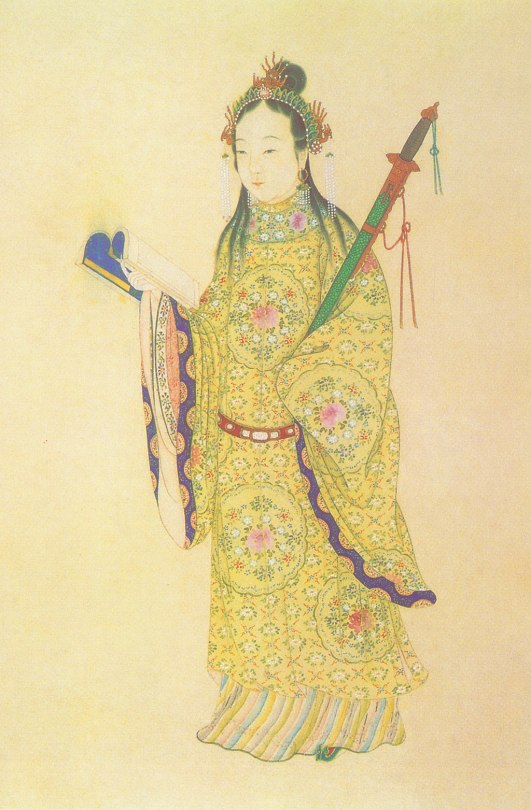
A portrait of Qin Liangyu.
So, what made these women leaders of armies while most women throughout Chinese history couldn’t even dream of such a thing? Fu Hao lived a very long time ago, well before the later Confucian system where wives are supposed to obey their husbands and serve at home. For the others, there are some common factors: growing up in a well-to-do family that educated daughters, demonstrated interest and skill in fighting and leadership, being around military power (true of a vast majority of male generals as well, of course), and some kind of unusual circumstance that gave them power, whether a husband or father allowing them to do so or an environment of unrest that gave them an opportunity.
The warrior princess trope exists for a reason: it’s the highborn daughters and wives of generals who are most likely to get the opportunity to command an army. And their stories are more well-known than, say, women like Chen Shuozhen/陈硕真, who came from destitute upbringings and called herself the emperor while leading a peasant rebellion that eventually failed. All history is biased, and contemporary Chinese history seems to favor those who quashed rebellions and promoted national unity.
Given these historical examples, it’s not so outlandish to imagine that Nihuang was educated by her father in the military arts from a young age, showed great fighting and leadership ability, and was then able to take command when he died during a crisis and while her brother Mu Qing was still too young. She is an exception in a field of men, as these historical women were. And like these women, she was very much still subjected to the expectations and boundaries of feudal women.
In some sense, show Nihuang is an ideal female Confucian role model. She is the perfect daughter and older sister who assumed the family mantle when there are no capable men, doing her duty under a corrupt regime for twelve years, with the implication that she will give up at least some of her responsibilities to Mu Qing when he’s ready. She is the perfect widow who never strayed from her arranged marriage pact. And she is the perfect potential wife who shed all of her commanding aura whenever she interacted with post-identity reveal Mei Changsu—she may question him but she will always listen to him, in the end. Her first scene is of a warrior princess soundly defeating men, and her last big scene is her telling Feiliu she wants to obey her Lin Shu-gege.
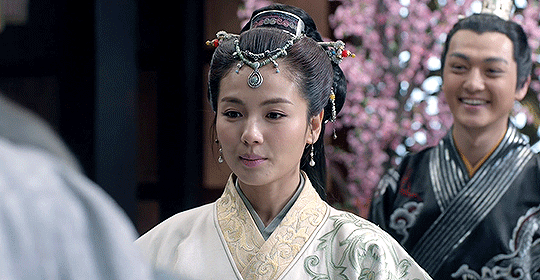
This is a far cry from book Nihuang, who moved on in those twelve years and found someone else to love. To be clear, there is nothing intrinsically wrong with characters displaying period-typical attitudes, and other female characters in canon, like Consort Jing, are compelling without being hidebound by tradition. Within the microcosm of NiF the show, the change to Nihuang’s character may only be due to the creators wanting to increase her screen time in a male-heavy show and add a tragic romance element that they felt the book lacked. But media doesn’t exist in a vacuum, and after some prominent examples of one-sided adaptation changes in recent years—The Rise of Phoenixes taking a book starring a strong female character and dramatically increasing the male character’s screen time for the actor to get top billing, Serenade of Peaceful Joy adapting a book centered around a princess’s futile rebellion against feudal expectations for women into a show about her loving daddy emperor trying to do the best for his daughter by keeping her in line, even Reset giving some of the main female character’s heroic moments in the book to the main male character in the show, to name a few—was Nihuang’s change from book to show a harbinger of the male-dominated Chinese television industry increasingly reshaping strong female characters into what they think women should be like?
This issue of media depictions affects historical women generals, as well. For various reasons, they haven’t gotten their big breaks in modern mainstream media, and the most famous Chinese female warriors remain Mulan and a few other very fictionalized characters who have had popular shows and movies made about their lives. A Qin Liangyu drama was supposed to be filmed a few years ago but never aired, and as typical of this era of Chinese media censorship, no one seems to know what happened to it.
With the lack of extant details for most of these military leaders, one can depict them as either true believers of Confucian values or as women who questioned and struggled against societal conventions. It isn’t hard to guess what’s more likely to be made today, with a slapped-on love story and plenty of screen time for the men to boot. If we can’t give a warrior princess a sword without always making her a dutiful daughter, wife, and patriot, perhaps we shouldn’t be telling her story to begin with.
#mu nihuang#nirvana in fire#琅琊榜#chinese history and culture#long post#a few more women cut for space:#Xiao Yanyan/萧燕燕#Liang Hongyu/梁红玉
347 notes
·
View notes
Text
Gan Ji after Sun Ce has him executed despite the many, many supernatural-level omens and everyone around him telling him it's a bad idea:

#ngl sun ce's death in ro3k was kinda funny#sun ce#rotk#ro3k#wu#romance of the three kingdoms#imagine being zhou yu coming back and they tell you your bro was killed by a dead wizard because for some reason he really hated wizards
16 notes
·
View notes
Photo
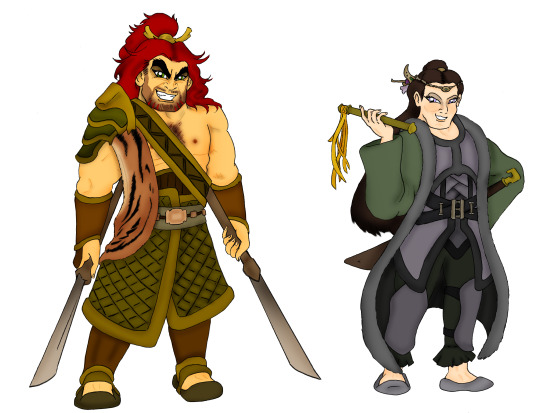
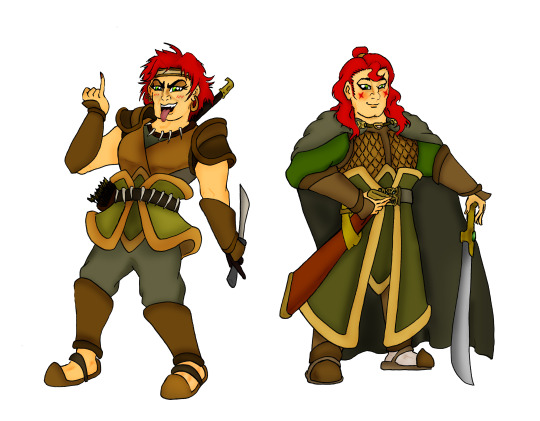
1. Sun Ce and Zhou Yu
2. Sun Shangxiang and Sun Quan
Sun Ce, the eldest son of Sun Jian, fast makes a name for himself as 'The Young Conqueror', leading his father's troops as well as defectors from Yuan Shu's rapidly-failing state to conquer and control the regions south of the Yangtze, carving a kingdom of his own which forms what will become Sun-Wu.
He is aided in this by a peerless strategist of keen wit and great vision who plays a further part aiding his family in what will become the War of the Three Kingdoms.
His name? Zhou Yu
Sun Shangxiang is a rambunctious tomboy who never misses out on a chance to crack skulls and irritate people but who treasures her family above all else.
Sun Quan is a meek, studious young man who prefers to resolve things diplomatically, though is prone to some odd behaviour on occasion.
Through them, the eastern kingdom of Wu forms its foundations.
Bit out-of-proportion on the first image. Not quite sure where but something feels a bit off. Might go over that.
Sun Ce is described as wielding two bronze spears. These are more or less the closest I could design while still being fairly practical, two long-handled blades which he wields with expert dexterity.
Zhou Yu's instrument there is a tasseled sceptre which strategists of the time used as signalling devices similar to the war-fans of samurai warlords.
In case you weren't aware, the raising of the little finger is the Chinese equivalent of flipping the bird. Sun Shangxiang does this a lot.
#Sun Ce#Sun Quan#Sun Shangxiang#Sun Jian#Zhou Yu#Sun Wu#Eastern Wu#Three Kingdoms#Romance of the Three Kingdoms#sanguosha#sangoku#ancient china#Han Dynasty#historical fiction#webcomic#ttoca
1 note
·
View note
Note
Do you know where I can read/buy JTTW in English? I was watching "Overly Srcastic Production" and I got invested in the story.
(Also I love what you do as Monkey Servant)
Sure there are free pdfs on JTTWRs blog here.
And also audio books for free online here as well.
I hope you love the story!!
28 notes
·
View notes
Text
Hi Producer (正好遇见你) Infodump
Disclaimer: I have no idea about the accuracy of the information shared in the drama, I'm merely transcribing for future reference purposes. Proceed with caution!
.
Ep 30-31: Ancient Makeup
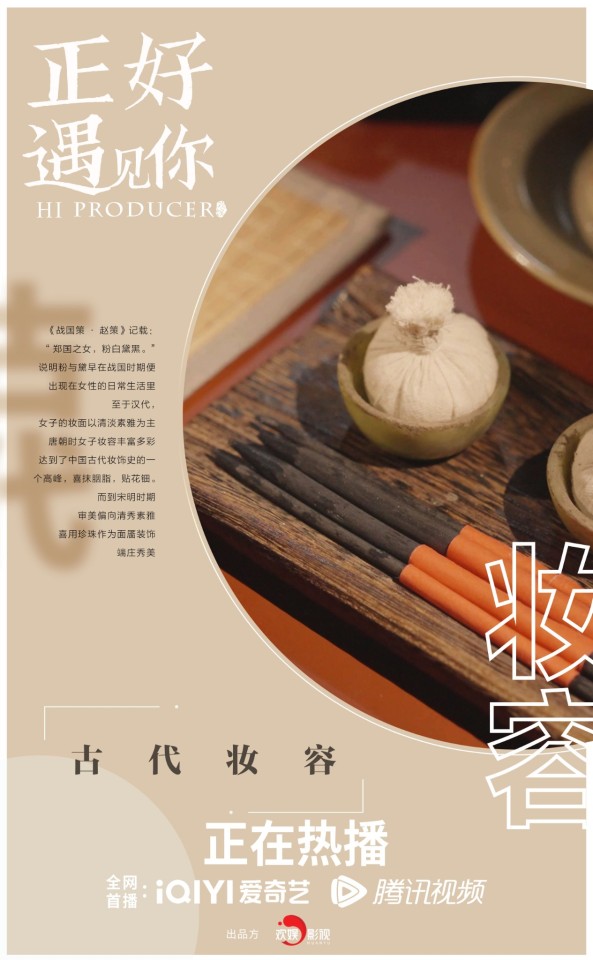

In "Strategies of Zhao" from "Zhan Guo Ce", women from Zheng wore makeup on their cheeks and brows. Cheek and brow makeup already existed in that era and were part of women's daily life. Men also used makeup.
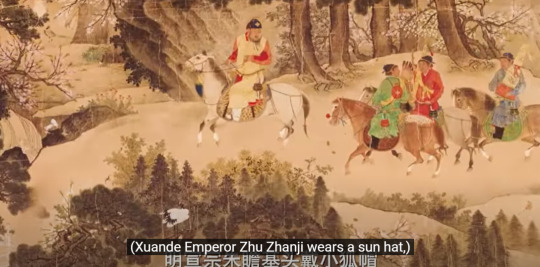
Xuande Emperor Zhu Zhanji wears a sun hat, pearl earrings, a military outfit with arrow sleeves, and a suit of yellow armor. How fashionable.
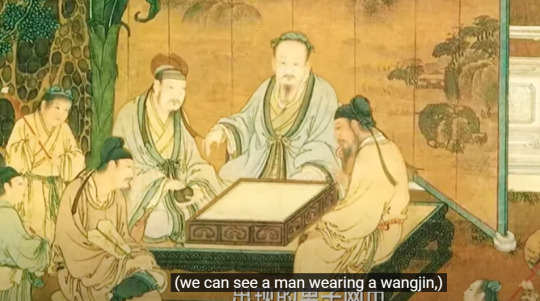
On this screen of 18 scholars [Qi Xiu Lei Gao], we can see a man wearing a wangjin, which was promoted by Emperor Zhu Yuanzhang. One day, Zhu Yuanzhang was on an anonymous trip to Shenle Temple. He saw a Taoist priest tie a wangjin under the lamp. Curious, he asked, "What might this be?"
Answered the Taoist priest, "It's a wangjin. Wrapped your hair with it and the hair shall remain tidy."
Zhu Yuanzhang was delighted. He thought the item bore the meaning of "unifying the land". He then decreed it be worn. According to "The History of Ming: Carriages and Clothing", all men of the Ming Dynasty, regardless of status, all wore a wangjin.
Shen Congwen made an inference after observing the colors of the outfits shown in "The Night Revels of Han Xizai", that it was produced between the fall of Southern Tang and the Chunhua era. Who can accomplish that now?
.
Recreating those makeup styles, the cultural meaning it carries, the social background behind the changes of outfit designs and makeup styles etc need to be paid attention to.
Wu Zetian's Peach Blossom Powder
youtube
Classic Makeup Restoration
youtube
.
"Hands as delicate as tender shoots, skin smooth and fair with shine. Neck slender like that of a swan, teeth white and lined-up perfectly.
A plump forehead and long thin curvy brows, a smile so enchanting, her eyes so alluring.")
In "Odes of Wei, the Classic of Poetry", the sung Princess Zhuang Jiang who was so graceful and gorgeous was the embodiment of the classical beauty of Chinese women. Over centuries, generations of women have pursued beauty tirelessly, leaving behind countless wonderful dreams created with poetry.
"Her waist is tied with a white silk stripe. Her ears are adorned with lustrous earrings. Her fingers are slim like the tips of a green onion. Her lips are red as if covered in vermilion."
That is the beauty of a woman's solemn makeup.
"Eyes filled with shyness. A faint smile with her red lips."
Such is the beauty of bashfulness.
"Mountains on the screens glitter with the morning sunshine, her fair hair on her fair skin is like a cloud over a snowy field. She lazily rises to paint her brows, and finally grooms after a long delay."
That is a woman's beauty at leisure.
"Her clothes flowy like clouds and her face gorgeous like blooming flowers. The morning dew blown by the spring breeze enriches the color of the blossom."
This is a woman's alluring beauty.
"Raindrops fall on her rosy cheeks, mingling with tears and her rouge."
This is the beauty of a woman's tearful countenance.
The beauty of Chinese women is reflected in the harmony and coordination of hairstyles, makeup, attire, footwear, and accessories. It forms a complete and systematic women's boudoir culture, leaving behind beautiful and captivating legends.
(Check out this gorgeous traditional style cosmetics chest btw😍)
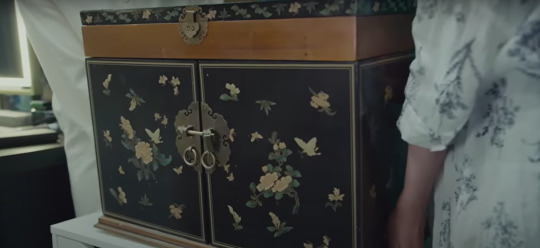
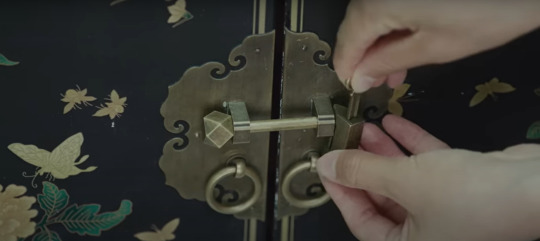



.
Documentary segment:
youtube
.
More Hi Producer posts
#cdrama#chinese drama#正好遇见你#Hi Producer#chinese history#traditional cosmetics#cosmetics#makeup#traditional chinese makeup
38 notes
·
View notes